As people want a constructive opposition party
By Lee Kyung-sik
Publisher of The Korea Post
Chairman Ahn Cheol-soo of the New Politics Committee (NPC) and Chairman Kim Han-gil of the opposition Democratic Party (DP) formed a united new opposition party named “New Politics Alliance for Democracy (NPAD) and have agreed to formally inaugurate the NPAD on March 26, 2014.
As things stand at this time, Ahn is sailing on a rough sea but eventually he is expected to come through because many people want a constructive opposition party, devoid of radical and pro-North Korean political elements, as an alternative political force to contain the government and the ruling party when they do not do their job right.
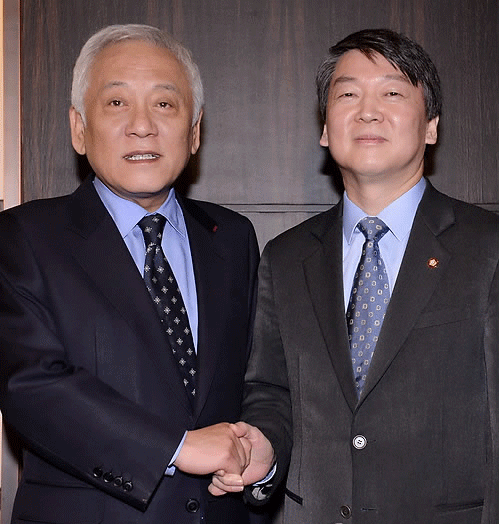
There have been a great deal of pros and cons and mud-slinging against Reps. Ahn and Kim from both the conservative ruling camp and the left-leaning group of the opposition camp, notably the radical progressive United Progressive Party (UPP) and the moderate progressive Justice Party (JP). Stiff resistance also came from within the DP, especially the pro-Roh Moo-hyun Faction led by the unsuccessful DP Presidential Candidate Moon Jae-in last year and those who had relatively little chance of being included in the main stream of the NPAD.
From the beginning the ‘marriage’ of Reps. Ahn and Kim was an extremely difficult task.
Ahn enjoyed a 35-50% approval rating in most of the public opinions surveys, very close to that of the ruling Saenuri Party. At one time (March 4, 2014), Ahn even got a higher rating (43.8%) than the Saenuri Party (43.3%), according to a survey carried out by Jowonchi and published by Ilyoshinmun (Sunday Newspaper). In contrast, the DP got only 6% when lowest and remained in the one-digit figure.
However, in terms of the number of the seats in the incumbent National Assembly Ahn had only two seats, while the DP had 126.
In other words, Ahn was a rising sun posing a formidable threat to the ruling camp, while the DP was a setting sun with very little possibility of any victory in the upcoming gubernatorial and mayoral elections on June 4 this year, in the National Assembly elections in 2016 and in the Presidential elections in 2017.
Then why did Ahn decide to merge with the DP at the risk of his own popularity rating?
Political observers say that at the present situation the competition would be a triangular contest between one ruling camp and two opposition camps where the opposition votes would be split while the ruling camp could win a solid gain. In plain mathematics, if the opposition coalition party wins 50% out of the 100% the two opposition parties will have to split the other 50% between them, while the ruling party will keep the solid remaining half. The political observers said, “The ruling party would be fishing in troubled waters.”
Conservative political observers claim that economic benefits of a total of eight trillion won (a little less than US$8 billion) were given to North Korea in eight years of the 10-year ‘Sunshine Policy’ of the late former President Kim Dae-jung (1998-2003) and the subsequent progressive President Roh Moo-hyun (2003-2008). The amount consisted of 4.58 trillion won in grant-type aid, 2.16 trillion won for the light-water nuclear reactor in North Korea, 980 billion won in cost payments and 599 billion won in investments in Kaesong Inter-Korean Industrial Zone and the Kumgang-san Tourism business.
When Kim DJ and Roh MH gave the money to North Korea, they told the people in South Korea that North Korea will never make nuclear weapons or missiles and that it has no ability to attack the South. Their claims, however, were proven completely wrong as the North Korean regime have carried out three nuclear bomb tests, upgraded its long-range missiles that could even hit targets in the mainland of the United States, and even attacked the South Korean territory, sinking South Korean naval ships and shelling the Yeonpyeong Island.
These series of incidents caused the plummeting of the popularity of the DP formerly led by Presidents Kim Dae-jung and Roh Moo-hyun. The image of the DP fell further down when it formed a coalition with the radical progressive party (UPP) and the allegedly pro-North Korea political groups led by Rep. Lee Suk-ki (now under detention in prison on charges of leading a pro-North Korean rebellion against the state), which enabled some suspected pro-North Korean political elements to gain entry into the National Assembly as legitimate lawmakers.
Another substantial cause of the loss of popularity of the DP was the overridingly large influence wielded by the pro-Roh Moo-hyun faction on the party led by former Senior Presidential Secretary Moon Jae-in during the rule of the late former President Roh.
In the Presidential election in December 2013, there were two opposition hopefuls, namely Ahn Cheol-soo and Moon Jae-in, while the ruling Saenuri Party had a single candidate, Madam Park Geun-hye. And naturally, the opposition leaders called for a single opposition candidate to compete with the single candidate from the conservative camp.
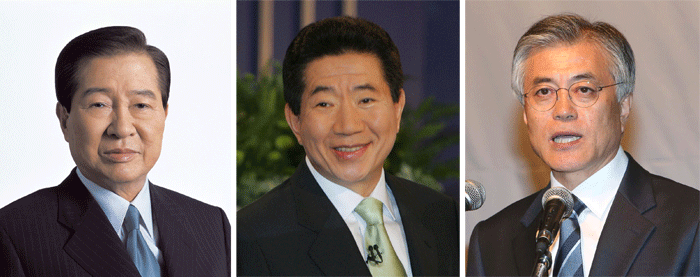
At repeated public opinion polls, the modest opposition Ahn Cheol-soo prevailed upon Madam Park Geun-hye and Madam Park, in turn, defeated Moon Jae-in. On the basis of the results of the public opinion polls, the opposition political leaders supported Ahn to compete with Park as a single candidate of the opposition camp. However, through the use of overwhelming power of the pro-Roh faction in the DP, Moon literally made Ahn reluctantly give his up candidacy in favor of Moon in spite of the fact that Ahn was the strongest of all three ruling and opposition candidates according to the public opinions polls. When Ahn gave up his candidacy and publicly announced his support for Moon as a single opposition candidate, his eyes were wet with welling tears and was choked with uncontrollable emotion. It was obvious to everyone that Ahn was ‘involuntarily’ conceding the candidacy to Moon.
Moon lost the Presidential election to Madam Park as he won 48% of the votes while Madam Part collected 51.6%. The small gaps between Park and Moon made the people, especially the opposition-oriented voters, lament the obstinacy on the part of Moon as Ahn could have easily won victory over Park according to the opinion polls, and achieve Jonggwon Gyoche (change of government) which had been the cherished desire of the opposition and opposition-oriented middle-of-the-roaders in Korea.
For the failure in achieving the change of government by the opposition camp due to Moon’s ‘greed for power,’ the pro-Roh Moo-hyun faction of the DP lost the support of the people, especially the middle-of-the-roaders and opposition-oriented voters, and brought the approval rating of the DP as low as down as to mere six percent.
When Ahn and Kim agreed to form the new party, Ahn said, "Well, I went into the 'tiger den' but I did not encounter with any tiger." Ahn meant that he did not meet any strong opponents in the DP as had been feared by his followers and supporters.
On this situation, political observers satirically said, "Mr. Ahn, the tigers don't stay in the den all day long, but go out hunting and you went in there while they had gone out looking for preys."
“Soon, the 'tigers' did return to the den and jumped on Ahn, whereupon Ahn threw them 'chunks of meat' and ran out of the den for life,” said the Korean-language media and the political observers.
They were referring to a situation that developed on March 17, 2014 when Ahn reportedly tried to eliminate the June 15 Declaration of 2000 and the October 4 Declaration of 2007 from the plank and policy of the NPAD, which had been contained in the party platform and principle of the DP.
The June 15 Declaration referred to the agreement made by the then President Kim Dae-jung of South Korea and the late President Kim Jong-Il of North Korea when Kim DJ visited Pyongyang, the capital of North Korea, for an inter-Korean summit meeting.
The October 4 Declaration concerns the agreement signed by the late President Roh Moo-hyun and President Kim Jong-il during Roh’s visit to Pyongyang in 2007 for the South-North summit meeting.
The inter-Korean contacts came in the form of South Korea’s economic assistance and cooperation with North Korea totaling nearly US$8 billion during eight of the 10 years of the rule by the liberal government of Kim DJ and progressive government of Roh MH.
This detente with North Korea, however, has been a target of criticism among the people in South Korea, especially the conservatives and the centrists because the money given the North has been used for further development and production of nuclear bombs and all types of missiles posing a great threat to the security of South Korea and its allies such as the United States and Japan.
Kim DJ and Roh MH had been assuring the Korean people that the North Korean regime had neither intention nor ability to develop nuclear weapons, still less causing any military hostilities against the South.
However, such claims of the two former Presidents have been proven completely wrong as the North has not only developed and produced nuclear bombs but physically attacked South Korea, including the shelling of the Yeonpyeong-do Island and sinking of the South Korean naval vessel, Cheonan-ham.
These hostile acts by the North against the South brought down the popularity rating of the DP among the people and caused the DP to lose the Presidential election in 2013.
For Ahn, the moderate opposition political leader, there were more than enough reason and justification not to carry on the two Declarations of Kim DJ and Roh MH in the new party (NPAD) which is aimed mostly at the middle-of-the-roaders and moderate oppositionists.
However, when the key members of Ahn’s team dropped hints that the two declarations would not be included in the party plank of the NPAD on March 17, 2014, the followers of Roh MH led by Moon Jae-in and supporters of Kim DJ jumped on Ahn’s men and ‘raised hell’ demanding inclusion of the two Declarations.
Perforce, on the following day (March 18) Ahn appeared on TV and denied that he had made any statement to the effect of excluding the two Declarations from the platform of the NPAD.
Thus, Ahn went into the tiger den to ‘eliminate the vestiges of the inter-Korean detente’ from the party platform of the new party but came out empty-handed having thrown the meat (concessions on the Declarations) to the tigers.
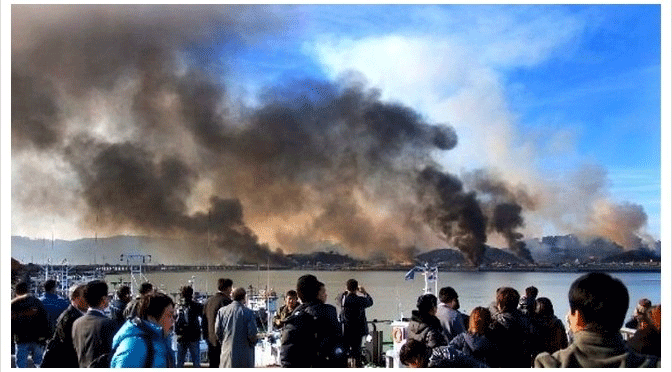
Ahn Cheol-soo, alone, enjoys an overwhelming popularity among the people, especially from the centrists and centrist-minded rightists and leftists who are considered to account for 55% of the entire population of the people. However, when his party should pick up people from the DP, which many political observers compare to a ‘sinking boat,’ it eclipses the image of Ahn and brings down his approval rating among the people.
In addition to the centrist-oriented political tendency of Ahn, there are a number of other reasons for supporting him. Among them is the desire on the part of the common people in Korea who want a constructive opposition political party devoid of leftists and North Korean sympathizers and supporters in order to control the ruling party and government running out of control.
In this respect, a political analysis written by Advisor Kim Dai-Choong of the front-running Korean-language daily, Chosun Ilbo, published on March 11, 2014, may be cited as an objective view. He wrote to the following effect:
Reports indicate that there are more opponents than proponents in the formation of the new political party by Reps. Kim Han-gil and Ahn Cheol-soo. The opponents seem to especially dislike Ahn’s ‘not honoring his promise that he won’t form alliance with the DP.’ The call Ahn a liar. The DP has little to lose but Ahn is getting the blame that he has surrendered his ‘new politics’ to the DP of ‘old politics.’
One may say that it is a losing game for Ahn when one is interested in determining which side is winning. However, such viewers might not be correctly seeing the importance of reorganizing the opposition camp or its timeliness. It is important to view the effort in the opposition camp to recover its true identity and put the parliamentary politics of this country back on the right track.
Some people view the effort of the opposition camp for unity as DP’s ploy to take advantage of it to win the gubernatorial and mayoral elections on June 4 this year. Other people view Ahn as an opportunist who is trying to get a free ride with the DP as he has not been able to recruit enough viable fellow travelers. Still others may view the party in power, which has been benefiting from the division of the opposition camp, as being attacking the new merger of the opposition groups because it can no longer fish in the troubled waters.
I want to ask them these questions: “Do you want to leave unattended the opposition camp that is substantially contaminated by the sympathizers and followers of the North Korean regime, extreme leftists such as the RO pro-North Korean revolutionary organization (led by Lee Suk-ki now in prison for suspected rebellion against the Republic of Korea) and those who negates the identity of the Republic of Korea and who have no sense of national security? Do you want to leave the opposition in that morbid condition? Do you want the democratic political system to remain in the state of suspension and standstill due to the absence of appropriate alternative political force?”
Reps. Kim and Ahn have already manifested their political line and direction in the formation of the new political organization.
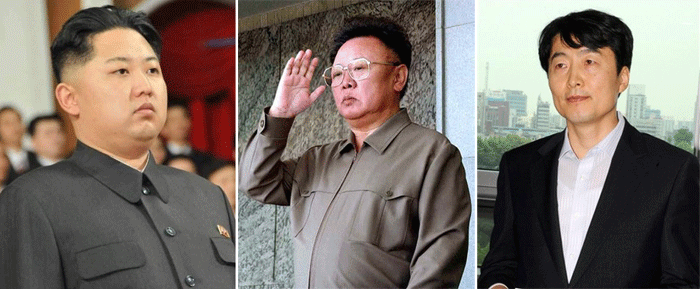
Rep. Ahn clearly declared on March 5, 2014 that he is seeking to form a political force that supports a firm national security and that is free from the controversy of pro-North Korean political identity. In the area of welfare, too, Ahn also showed his will to resist the so-called ‘welfare populism.’
The DP leaders, who were aware of the existence of heterogeneous elements in the party, including the pro-Roh Moo-hyun faction (led by the unsuccessful 2013 opposition Presidential candidate Moon Jae-jin), do not openly show an out-right support to Ahn’s position but are acquiescing at Ahn’s position. For instance, DP Floor Leader Jun Byung-Hun said, “There is no sanctuary from change and it includes the policies and political line.” They also found fault with the undue old practices and those who enjoyed unduly vested rights.
This is a great change for the DP which, in order to form a coalition with the (radical progressive) United Progressive Party (UPP) at the National Assembly general elections in 2012, took sides with the UPP in opposing the Korea-US FTA (free trade agreement), construction of the naval base on Jeju Island and demand for the abrogation of the National Security Law. The DP even agreed with the UPP in supporting ‘conscientious objection to military service,?trying to justice draft dodging in South Korea.
Reps. Kim and Ahn then declared their position on the ‘change of government’ through victory in the Presidential election in 2017. It indicated that the new party was looking far beyond the upcoming local elections on June 4 this year and that it was not a makeshift coalition aimed temporarily at the local elections.
In view of the above, it is too early to say that Reps. Kim and Ahn are lying or using crafty means--let alone being opportunistic.
Politicians adept themselves to the changing realities. Politics is not a world where only virtuous and noble gentle people live.
The late former President Kim Dae-jung, too, retracted his declaration returning to the political arena after his public announcement of retirement from politics. The government of President Park Geun-hye, too, does not honor the election pledges of welfare improvements as she realized that realistically she was unable to keep them. The late President Park Chung-Hee changed the Constitution in order to run for a third term in disregard of his promises against it.
The most important question for the successful reorganization of the opposition political camp is how well Reps. Kim and Ahn can straighten out the pro-Roh Moo- hyun faction in the party (led by Moon Jae-in). The pro-Roh leaders of the DP are outwardly silent at this time but inwardly they must be restless and nervous.
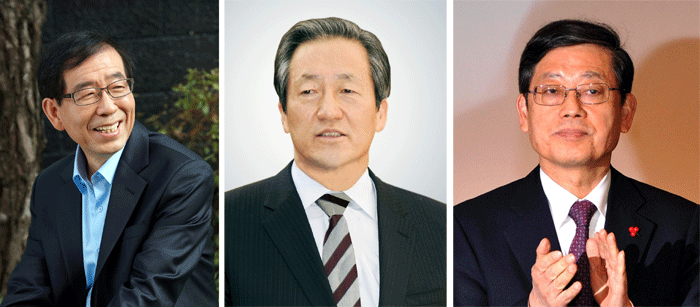
In the course of rapid industrialization and economic development in Korea (in the 1960-70s), there were political oppressions and they gave birth to anti-government elements and at one time they were an icon among Korean politicians. Leading them were the pro-Roh political force.
These radical opposition elements, however, are losing their ground as their position is no longer viable together with their political line in the changed political environment of today.
Emergence of the Kim-Ahn syndromes may be considered to derive from the common belief that the way of thinking of the pro-Roh group is becoming outdated and can no longer speak for the present generation or have any solution to the problems of today.
This is why we should favorably view the birth of a new opposition political party. It would be a malaise if we should have a government formed by the pro-Roh political force controlled by pro-North Korean leftists or by an opposition political party taken hostage by the pro-Roh political elements.
If we should let the control of the government be taken over by a political force which denies the identity and justification of existence of the Republic of Korea and which tries to run the government with a revengeful and hostile attitude, they could turn the country into a state of war and carnage.
At this time, it is difficult to be optimistic that the new party of Reps. Kim and Ahn will be successfully born and fare well. There will be many resistants inside the party and also lot of kibitzers outside. Many of the leaders and members will have conflicting personal interests. Some may even think that they have been had, while others may feel unduly discriminated against.
However, one should realize that the development is for neither the person of Kim nor for that of Ahn. In a broad sense, they are nothing other than the‘stones on the Baduk game board.’ We should look at the birth of a new opposition party not with personal interest in mind but from a broad perspective.
If the new opposition political party, which supports the identity of the Republic of Korea and which safeguards the national security, can be a good alternative political entity to one in power.

